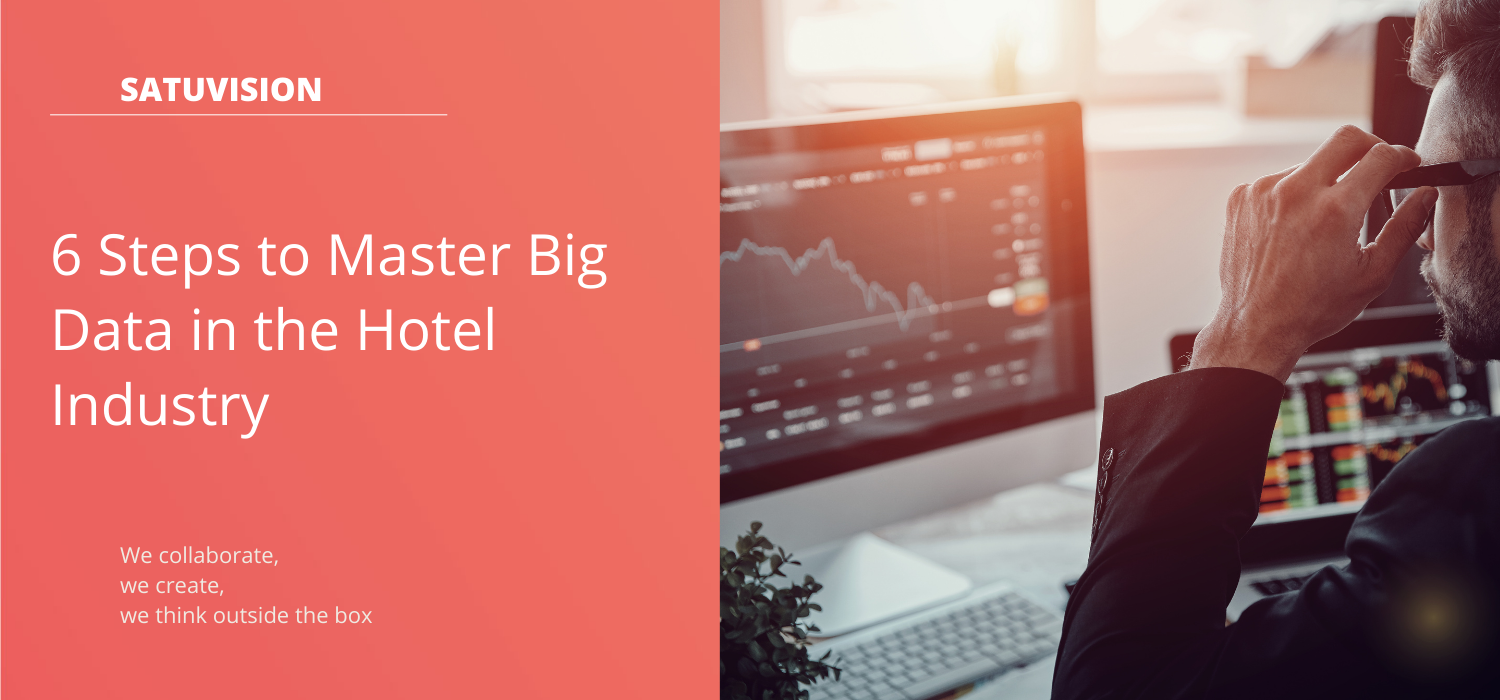Whether you’re a hotel owner or a manager, harnessing the potential of Big Data can set your business on a path to success. In 2023, the Indonesian hospitality real estate market is valued at USD 1.64 billion and is projected to grow to USD 2.9 billion by 2028, with a CAGR of 12.07%. Realizing this, we have to highlight the significant role of big data in the hotel industry, which is rapidly expanding.
Now, we will explore why big data is vital in the hotel industry and give you a practical six-step roadmap to make it work for your hotel. Scroll down your screen to learn more about the importance of managing big data in the hotel industry.
Table of Contents
What is Big Data?
Big Data, in simple terms, is the vast amount of data that organizations generate and collect daily. This data comes from various sources like guest reservations, online reviews, website traffic, social media interactions, and more.
What makes it interesting are the three Vs:
- Volume: Big Data involves immense amounts of data that traditional methods struggle to manage.
- Velocity: Data is generated at lightning speed, thanks to the digital age’s proliferation.
- Variety: Big Data comes in diverse formats, including text, numbers, images, videos, and sensor-generated data.

In essence, Big Data in the hotel industry is all about dealing with large volumes of data generated rapidly and in various forms. In the context of the hotel industry, it encompasses a wide range of information – from guest booking details and preferences to social media trends and market analytics.
Read More: How to Invest in Technology to Improve Efficiency and Customer Service in the Hospitality Industry
Why Is It So Important?
The hotel industry is very competitive. It requires a deep understanding of guest preferences and market trends to be at the top. We will talk about the methods later, but first, let’s understand how important Big Data is for your business. Here, we explain it to you.
1. Personalization: A Stay Uniquely Yours
Thanks to Big Data, you can now get to know the guests a bit better. Imagine walking into a room that’s been set up just how you like it or getting recommendations for activities that are totally up your alley. That’s what mega-hotels are doing now – they’re using data to understand your preferences and make every stay feel more personal and special.
2. Pricing Optimization: Make the Best Deal
Who doesn’t love a good deal? Hotels are using smart tech to make sure you get the best value for your stay. Think of it as a savvy friend for your guests who’s always on the lookout to get them the most value for their money. This tech lets you adjust room prices based on real factors, so potential guests can find a great room at a great price in your hotel.
3. Operational Efficiency
Behind the scenes, hotels are turning into super-efficient spaces. You can use data to make sure everything runs smoothly – from reducing waste (which is great for the planet) to ensuring there’s always someone there to help your guests when needed. It’s all about ensuring their stay is as comfortable and hassle-free as possible.
4. Marketing Effectiveness: No More Irrelevant Ads
You wouldn’t want to bombard the guests with ads and offers that don’t interest them. Big Data is helping major hotel chains understand what makes you tick. This means you’ll see more of what you like – whether it’s a spa weekend or an adventure getaway – leading to better experiences for you and better results for the hotels.
Pro tip: Use Big Data to tailor guest experiences, optimize pricing, improve operational efficiency, and target marketing for competitive advantage in the hotel industry.
Thrive Like These Mega-Hotels by Using Big Data
Mega-hotel companies have smartly harnessed the potential of Big Data to revolutionize their operations and take guest experiences to exciting new levels. Let’s take a closer look at these impressive examples to see how they’ve made Big Data work wonders:
- Marriott International: Around the 1970s, Marriott competed with Holiday Inn, which is occupying the market. Using big data from customer surveys and pilot tests, they created a new brand, Courtyard by Marriot, whose concept is entirely new: nice but also affordable. This leads to $200 Million investment per year and billions of dollars of revenue.
- Hilton Worldwide: Hilton uses a cloud-based analytics system for big data to support its commercial actions, enabling them to gain an annual revenue of $35 billion per year.
- AccorHotels: AccorHotels leverages data analytics to enhance marketing campaigns and guest engagement, resulting in improved customer loyalty and revenue growth.
- Hyatt Hotels Corporation: Chris Brogan, Senior Vice President of Strategy and Analysis at Hyatt Hotels Corporation, said that in 2014, Hyatt launched a new program after analyzing the big data of customer behavior. “It increased the incremental room revenue, post-reservation, by 60%, 2014 versus 2013.”
A Guide to Master Big Data in The Hotel Industry
It’s time for you to follow these steps and master Big Data in the hotel industry effectively. These steps will empower your hotel business to unlock the full potential of Big Data for growth and success.

Step 1: Understand Your Data Sources
To master Big Data in the hotel industry, start by understanding where your data comes from. Identify sources such as your hotel’s reservation system, website analytics, guest reviews, and social media mentions.
Tools you can use: Google Analytics, Facebook Insights, and customer relationship management (CRM) software can help gather and organize this data.
Step 2: Clean and Organize Your Data
Once you’ve identified data sources, the next step is to clean and organize the data. This involves removing duplicates, correcting errors, and ensuring data consistency.
Tools you can use: Microsoft Excel, OpenRefine, or more advanced solutions like Apache Nifi can assist. Clean data forms the foundation for accurate analysis.
Step 3: Data Analysis and Visualization
With clean, organized data, it’s time to analyze it. Create visualizations like charts and graphs to make complex data more understandable. For example, visualize guest preferences, booking patterns, and occupancy rates to spot trends.
Tools you can use: Use data analysis tools like Tableau, Power BI, or even Excel to extract insights
Step 4: Implement Predictive Analytics
Predictive analytics is a powerful tool in the hotel industry. It allows you to forecast future trends, demand, and guest behavior. Predicting occupancy rates, pricing strategies, and guest preferences can optimize your hotel’s operations.
Tools you can use: IBM SPSS, RapidMiner, or Python libraries like Scikit-learn can help build predictive models.
Step 5: Personalize Guest Experiences
One significant advantage of Big Data is its ability to personalize guest experiences. Utilize guest data to offer tailored services, like personalized recommendations, room preferences, or exclusive offers.
Tools you can use: Marketing automation platforms like HubSpot or Mailchimp can help automate personalized communication with guests.
Read More: 7 Powerful Ways to Use Customer Data to Skyrocket Your Hotel Revenue
Step 6: Continuous Learning and Improvement
Understanding Big Data in the hotel industry is an ongoing journey, so you must embrace continuous learning and improvement. Stay updated with the latest trends and technologies in data analytics. Attend webinars and workshops, or consider hiring data analysts to interpret data effectively.

Conclusion:
Mastering Big Data in the hotel industry is no longer a luxury but a necessity to stay competitive and relevant. By following these steps, hotels can enhance guest experiences and operational efficiency to drive significant growth.
The journey involves collecting diverse data, analyzing it for actionable insights, and continuously adapting strategies based on these insights. Embracing Big Data with the right tools can transform a hotel’s service and business strategy approach, leading to sustainable success in the dynamic modern hospitality landscape.
Frequently Asked Questions
The hospitality industry grapples with several big data challenges, including handling large quantities of data, maintaining data quality, ensuring data security, bridging the skills gap in big data analysis, controlling expenses, and integrating various software platforms.
Hotels primarily collect contact details. Gathering essential data like a guest’s full name, mailing address, telephone number, and email is a fundamental aspect of guest information collection.
At SATUVISION, we understand the unique challenges and opportunities in hospitality marketing. Let us help you navigate the exciting world of Big Data, transforming your data into strategies. Whether you’re a boutique hotel or a beach resort, our expertise in digital marketing can help you optimize your operations and boost your brand. Ready to embark on this journey with us? Let’s turn your data into your most valuable asset!





